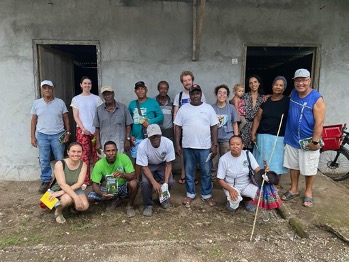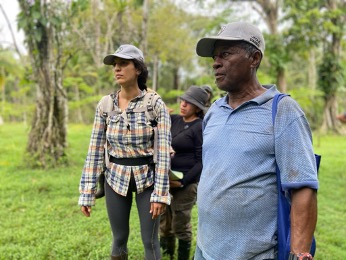

How Can Small-Scale Landholders Access Payments for Conservation?
IIE Centennial Fellow Jessica Ausinheiler Aims to Protect and Promote Biodiversity in Panama
October 25, 2024
Jessica Ausinheiler, IIE Rodman C. Rockefeller Centennial Fellow 2023-2024
Panama contributes very little greenhouse emissions, yet it is disproportionately vulnerable to the harmful effects of climate change. These challenges, compounded by poverty, threaten to strain the natural resources of a country considered one of the most biologically diverse in the world.
As part of its efforts to empower Fulbright alumni to take climate action, IIE selected Jessica Ausinheiler as a Rodman Rockefeller Centennial Fellow for the 2023-24 year. With support from the Fellowship, Ausinheiler is currently in Panama, working with smallholders to design and map a comprehensive system that pays them for implementing conservation services. The project seeks to increase smallholder participation in conservation and a commensurate decrease in smallholder deforestation in Panama and globally.
In her second blog entry, Ausinheiler explores the complexities of taking climate action against a backdrop of socio-economic inequities and explains how she aims to respond to climate change in an equitable manner.
Casildo is a rancher who owns 98 hectares in Jaque, a remote town in Panama’s eastern province of Darien. With the town located a half-day boat ride away from the nearest highway, Casildo pools boat fuel money with his neighbors to visit his ranch each week. He’s a member of a community-based environmental organization, Ganaderos Buscando Conservar (Ranchers for Conservation); he and the group’s eleven ranchers collectively own 600 hectares. With the help of a community organizer who connected them with grants totaling $50,000, they installed fences to separate their cattle from forest that will grow, planted coffee, and other agroforestry products to help diversify their income; documented their baselines; and created agroforestry plans for each of their ranches.

Small-scale landholders like Casildo steward a significant portion of the world’s rainforests. And while Panama’s low population and dense forest cover make it one of the few carbon-negative countries in the world (ccacoalition.org), the country has lost 3.2% of its total humid primary forest between 2002 and 2023—mostly in the Darien province of rural east Panama where Casildo lives (GFW 2023). Ganaderos Buscando Conservar hopes to access the global market for conservation payments— including the $920-million carbon market, which pays for metric tons of carbon dioxide that trees sequester from the air and thus would help to sustain their long-term rainforest stewardship (Ecosystem 2023). Unfortunately, community organizers and carbon experts alike consider Panama’s voluntary carbon market to be too complex and expensive for groups like Casildo’s to equitably access. In the words of one expert from the Climate & Land Use Alliance, “In principle, carbon can be almost everything as long as you can reduce emissions and account for it. But the challenge is that getting to a definition… is so complex, and it’s organized in a way that’s difficult to understand that makes it difficult to engage stakeholders, including indigenous peoples and campesinos…”
As an IIE Centennial Fellow, I seek to find near-term options for connecting groups like Casildo’s to financial incentives that can help better steward their forests. To start, I’ve conducted an extensive literature review and interviewed over a dozen carbon experts globally and nationally to better understand our options in Panama. Here, unlike other Central American countries like Mexico, Guatemala, and Costa Rica, there are no national or other large-scale (jurisdictional) programs that pay landholders for growing forests and other nature-based solutions such as afforestation; reforestation and revegetation (ARR); the reduction of emissions from deforestation and forest degradation (REDD); and agroforestry and silvopasture. One of the founding members of Panama’s nascent national carbon market shared in an interview, “To date, we have not found a solution for smallholders. It [the national market] is not a good solution for everyone.”
Today’s voluntary carbon market is very small with just five established standards: the American Carbon Registry, Plan Vivo Climate, Gold Standard, Verra Carbon Standard, and Climate Action Reserve, with Verra certifying 70% of the market (eco-business 2024). These standards and certifications require project developers to complete extensive fieldwork and paperwork and navigate comprehensive protocols. They also require access to tens to hundreds of thousands in initial capital investment. A representative of one standard confessed, “I don’t know what the real cost of certification is… and it scares me to think about it.” One executive of the Project Developer World Wildlife Carbon shared, “One reason we don’t do smaller projects is that our overhead is over 50%, which kills us ethically and practically because we want to give the majority of the money to the people… the economics are difficult.” A co-founder of the Panama-based Project Developer Ponterra revealed, “We calculate the startup costs for regrowing 10,000 hectares of humid forest to be about one million USD.”
My project is a response to the inequity that exists within the voluntary carbon market vis-a-vis small-scale landholders like Casildo’s.Halfway into my fellowship, we have identified three potential ways to connect Casildo’s group with conservation payments:
- Partnering with newcomers that are quantifying and selling carbon directly. Check out this vlog about a recent site visit to Jaque with 44.Moles, a technology startup that quantifies the carbon sequestration of forests with terrestrial laser scanning and sells it directly to buyers in the carbon market, primarily companies.
- Extending an existing Verra-certified project elsewhere in the country to the areas where our small-scale landholders operate.
- Obtaining private funding for preservation and reforestation activities, bypassing carbon certification and credits altogether.
Success is not guaranteed. However, my recent trip to Jaque, along with even more recent conversations with pioneers in the community-based conservation space in the Interior of the country, keep me hopeful. Stay tuned.
Named in honor of IIE’s Centennial and association with the Fulbright Program, the IIE Centennial Fellowship seeks to help enhance Fulbright as a life-long experience and recognize alumni whose work embodies the program’s underlining values of mutual understanding, leadership, global problem solving, and global impact.